Two days from now, on July 12, we will commemorate the 8th anniversary of the historic ruling of the Permanent Court of Arbitration (PCA), declaring the West Philippine Sea as belonging to us. Numerous countries have hailed the decision as a victory not only for the Philippines but for international law.
But given what is happening right now in the West Philippine Sea, some are asking, is it even right to feel victorious?
China persists on rejecting the arbitral ruling. It refuses to recognize the jurisdiction of the PCA and has even modified its nine-dash line claim to a 10-dash line claim. In recent weeks, it has intensified its aggressive acts in the West Philippine Sea in open defiance, contrary to the norms of decency and fairness, and in violation of the established rules-based international order.
Consider this: The Chinese have been making many audacious attempts to block reprovision missions. They cause collisions, use water cannons, and intimidate our soldiers and our fisherfolk. Most recently, not content with their already reprehensible behavior, the Chinese Coast Guard actually had the gall to go on board our vessels. They rammed our boats, seized firearms and other equipment, and used knives on our inflatable boats. Brandishing axes and knives, they told our soldiers that they were “trespassing,” and one was injured.
We do not see any letup in these brazen acts soon. Indeed, we can only expect them to increase in intensity and frequency, despite the Philippines having already filed multiple diplomatic protests with China.
It is under these circumstances that we find ourselves commemorating the 2016 ruling of the PCA.
When we see China’s unrelenting acts in the West Philippine Sea, it is easy to feel disheartened and to doubt whether the PCA ruling is indeed a victory. We cannot even rest easy because we know that China knows no bounds when it comes to using its disinformation networks to twist and confuse the narrative.
What victory, we might ask, when we have to keep watch every minute so that what has already been established as ours will not be taken over by another, and our people will not be harmed by a bold trespasser?
Fortunately, many like-minded countries are lending their support in terms of public pronouncements and, most especially, tangible help in terms of boosting our defense and security capabilities. While we beef up our own ability to protect what is ours, our military is adopting a Comprehensive Archipelagic Defense Concept, shifting from a focus on internal to external security, and while numerous sectors in Philippine society are coming together to assert that we are not yielding to China’s bullying tactics, we are also supported by countries that equally value the rule of law and uphold the international order.
Indeed, the anniversary of the ruling is significant not only for the Philippines but also for the peace and stability of the global community. The PCA award is a precedent for resolving disputes peacefully based on international law. It reinforces the principle that all nations, regardless of size or power, are equal under international law — a sentiment eloquently articulated by the late Secretary of Foreign Affairs Albert del Rosario, who stated that “International law is the great equalizer among states.”
We at the Stratbase ADR Institute are staunch advocates of cooperation among sectors and nations in upholding what is right and good in the international sphere. To mark the anniversary’s ruling, we, in partnership with the Australian Embassy in the Philippines and the United States Embassy in the Philippines, will hold a conference themed “The 8th Year of the Arbitral Victory: A Collective Pursuit of Maritime Security in the West Philippine Sea.”
The event will bring together government officials, members of the diplomatic community, scholars, and policy experts in an in-person discussion to exchange views and re-affirm the strategic value of the arbitral tribunal ruling towards sustaining the rules-based international order in the Indo-Pacific region.
There will be four panels throughout the day, each with its own set of speakers and open forum sessions. The first panel on “A Shared Commitment to Advance the Rules-Based International Order” will underscore the importance of a collective approach in addressing asymmetric security challenges, particularly in the maritime domain. Panel 2, “The Fundamental Tenets of the Laws of the Sea as an Instrument to Peace, Security, and Stability,” will illustrate that international law serves as a great equalizer across the international community.
Panel 3, “Reinforcing the Philippines’ External Defense Capabilities,” will highlight the strategies employed and challenges faced by the Philippine military in effectively safeguarding the Philippines’ rights in the West Philippine Sea. Finally, “Assertion of Rights and Responsible Conduct in the West Philippine Sea” will illustrate how the Philippines has effectively and responsibly responded to aggression in the West Philippine Sea.
The Philippines is not alone in this struggle, working with like-minded partners such as the United States, Australia, Canada, Japan, France, and the European Union among others as part of the collective effort to ensure security, stability, and prosperity in the Indo-Pacific region. And, within our borders, the Filipino spirit is awakening and will be ready to uphold our rights with our legendary resilience and resolve.
Thus, the PCA ruling is a victory in its truest sense. It highlights that when something is lawful and right, it deserves to be fought for — no questions or second thoughts about it.
Victor Andres “Dindo” C. Manhit is the president of the Stratbase ADR Institute.
